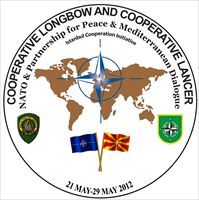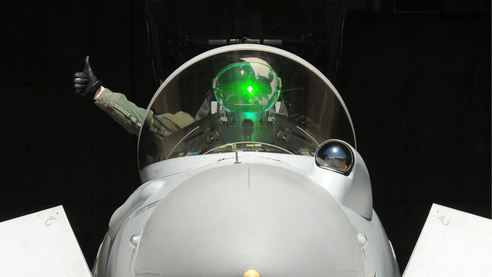MADRID, SPAIN — NATO will conduct exercises Cooperative Longbow and Cooperative Lancer 2012 during the period 21 to 29 May 2012 in the former Yugoslav Republic of Macedonia*. Planning for these exercises began in spring 2011 with the aim of improving interoperability between NATO and partner countries, within the framework of Partnership for Peace program.
 |
Exercises Cooperative Longbow and Cooperative Lancer aim is to educate, train and exercise delegations of selected partner nation armed forces in order to promote interoperability with NATO land forces. Cooperative Longbow 2012 and Cooperative Lancer 2012 include participation from 13 partner nations with approximately 1.000 troops.
Participating countries are:
- Armenia
- Austria
- Azerbaijan
- Belarus
- Bosnia and Herzegovina
- The former Yugoslav Republic of Macedonia*
- Georgia
- Kazakhstan
- Moldova
- Montenegro
- Serbia
- Switzerland
- Ukraine
The planning, preparation, conduct and evaluation of the exercise will follow a cooperative, integrative and iterative management approach to meet the requirements of the Alliance and those of Partner nations to the highest degree possible.
Lieutenant General Alfredo CARDONA TORRES (ESP Army), Commander Allied Force Command Madrid, is the Officer Conducting the Exercise while Brigadier General Giovanni SAVARESE (ITA Army) is NATO Co-Director for the Exercise in close cooperation with Colonel Sinisha STAMENOV, Co-Director from the Army of the former Yugoslav Republic of Macedonia*.
Exercise Cooperative Longbow is an exercise designed to train a brigade-level headquarters operating within the framework of a NATO Crisis Response Operation.
Exercise Cooperative Lancer is a training exercise whose aim is to improve capabilities in selected tactical tasks in support of crisis prevention, conflict resolution and post-conflict peace building.
The scenario for both exercises, LONGBOW and LANCER, is based on a fictitious United Nations-mandated, NATO-led Crisis Response Operation.
Two International Organizations, the United Nations High Commissioner for Refugees (UNHCR) and the International Committee of the Red Cross (ICRC) cooperate helping us to create a more realistic scenario. Representatives for these two organizations will be posted in the cell tasked to influx incidences related to their specialties.
The training will be conducted in the Krivolak military training area, located approximately 100km south-east from Skopje, the former Yugoslav Republic of Macedonia.
Partnership for Peace is a programme launched in 1994 and is based on practical bilateral cooperation between an individual country and NATO. It allows Partner Countries to build relationships with NATO, choosing their own priorities for cooperation. The purpose of the Partnership for Peace programme is to:
a. Increase stability
b. Build confidence
c. Diminish threats to peace
d. Build strengthened security relationships.
The complexity of international crises requires a comprehensive and regional approach where all the actors of the international community (NATO, UN) play their part of the game in cooperation with key regional players.
* Turkey recognises the Republic of Macedonia with its constitutional name
Source:
Allied Command Operations
NATO

 von
von 